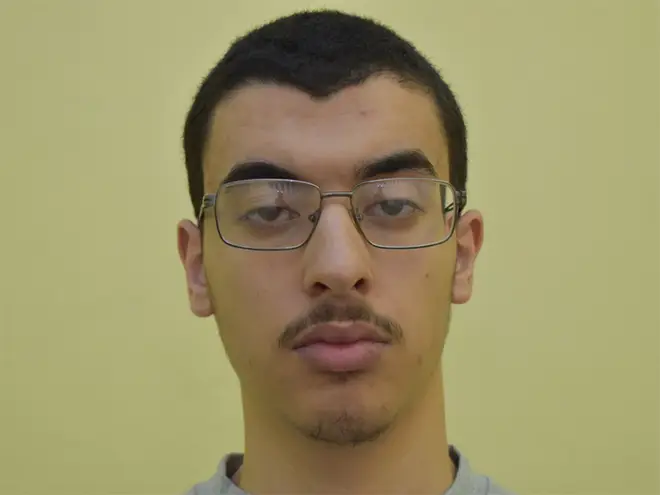
Richard Spurr 1am - 4am
19 August 2020, 07:17

Hashem Abedi, the brother of the Manchester Arena bomber, is facing life in jail for mass murder and sentencing will start on Wednesday.
The Islamic State-inspired jihadi helped his sibling, Salman, attack after an Ariana Grande concert on the night of May 22 2017, the Old Bailey was told.
Abedi, now 23, was found guilty of 22 counts of murder, attempted murder, and plotting to cause an explosion likely to endanger life.
Hashem Abedi was thousands of miles away on another continent when his older brother Salman calmly crossed the foyer outside the Manchester Arena at 10.30pm on Monday May 22 2017 with a deadly bomb hidden in his large backpack.

Manchester Arena bomber's brother due to be sentenced
The defendant, who had travelled to Libya before the bombing, was extradited back to Britain to face trial.
The senior police officer leading the investigation said it was possible Hashem was the senior partner in the plot.
Detective Chief Superintendent Simon Barraclough told reporters: "If he hadn't been brought to justice and tried for this offence, where would his career as a terrorist have led him?"

Manchester Arena attack survivor says anniversary will be different with lockdown
The jury deliberated for five hours to find him guilty on March 17 - just days before trials were halted as the nation was plunged into lockdown.
Hashem Abedi, who absented himself from much of his trial and sacked his legal team, now faces a two-day sentencing before Mr Justice Jeremy Baker.
Families of the victims and survivors will follow the hearing by live link from Manchester, Leeds, Newcastle and Glasgow.
It is understood that Abedi cannot be handed a whole life sentence because he was under the age of 21 at the time of the offences.
However, he could be given multiple life sentences with a minimum term starting point of 30 years.
Speaking ahead of the sentencing, Figen Murray, whose 29-year-old son, Martyn Hett, was among the victims, said: "I trust the British legal system.
"Whatever the judge gives this person will be just punishment for a crime he committed."
But Mrs Murray said the sentence will not bring closure for her.
"We as families have a life sentence - ours is until the end of days.
"As a mum, losing a child is the ultimate life sentence," she said.

Manchester Arena victim's mum tells James O'Brien about Martyn's law
During the trial, prosecutor Duncan Penny QC said Abedi was "just as guilty" as the bomber who killed 22 men, women and children aged between eight and 51.
From January 2017, the brothers set about buying nuts and screws for shrapnel and ordering chemicals from Amazon to make the homemade TATP explosives, with unwitting help from friends and relatives.
They hid their activities by switching mobile phones and using a variety of runaround vehicles, despite neither passing their driving test, to transport components around the city.
They also secured two separate addresses away from their home in Elsmore Road, Fallowfield, Manchester - one to take delivery of the components and the other for a bomb-making factory.
Their plans were briefly scuppered when their parents insisted they join them in Libya in April 2017 amid possible concerns about their descent into radicalisation, police said, forcing the brothers to stockpile their stash in a second-hand Nissan Micra, bought for £250 the day before they left the UK.
Returning alone, Salman bought a rucksack, more shrapnel, constructed his bomb in a rented flat in central Manchester, and carried out reconnaissance missions.
Jurors were shown chilling CCTV footage of Salman travelling to the foyer of the Arena, before detonating his bomb at 10.31pm on May 22, just as crowds were leaving the venue.
Afterwards, Greater Manchester Police found Hashem's fingerprints at key addresses and in the Micra, which still contained traces of explosives.
He was arrested in Libya the next day and extradited last summer.
A small scrap of a Consumer's Pride vegetable oil tin from the bomb site was matched to discarded pieces containing Hashem's prints which were found elsewhere.
Hashem had hoarded the tins from a takeaway where he worked and fashioned prototype components, even though none was used in the final device.
Mr Penny said Hashem was "at times chauffeur, at times quartermaster, at times electrical technician" in the plot.
Following his arrest, Hashem had tried to "point the finger of responsibility" at his dead brother but Mr Penny said it was merely "an attempt to evade responsibility for his own culpability, for the cruel and cowardly carnage that took place at the Arena that night".